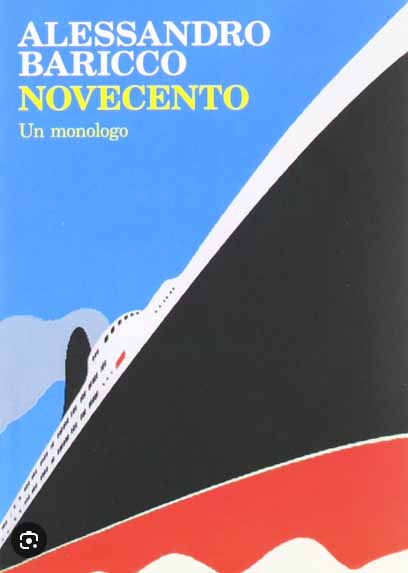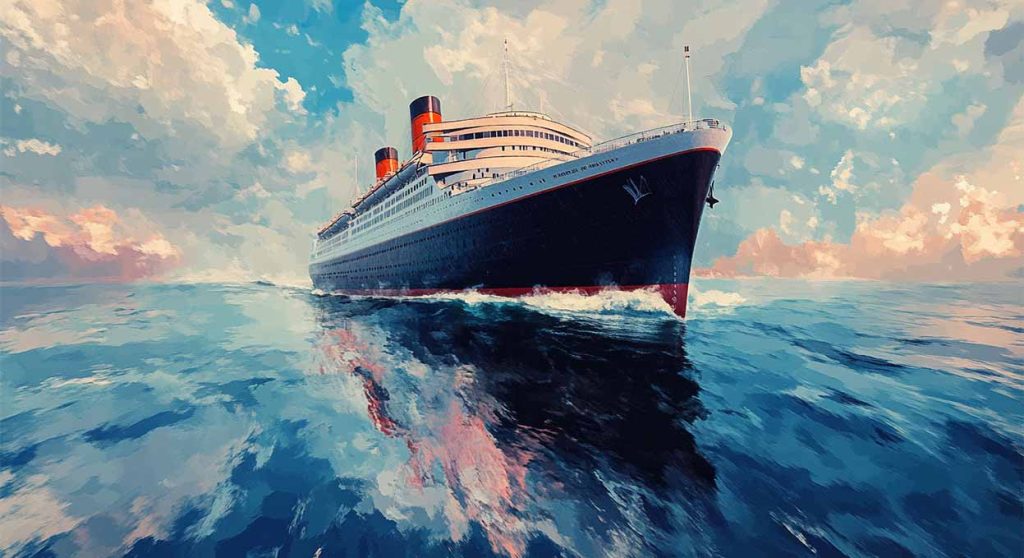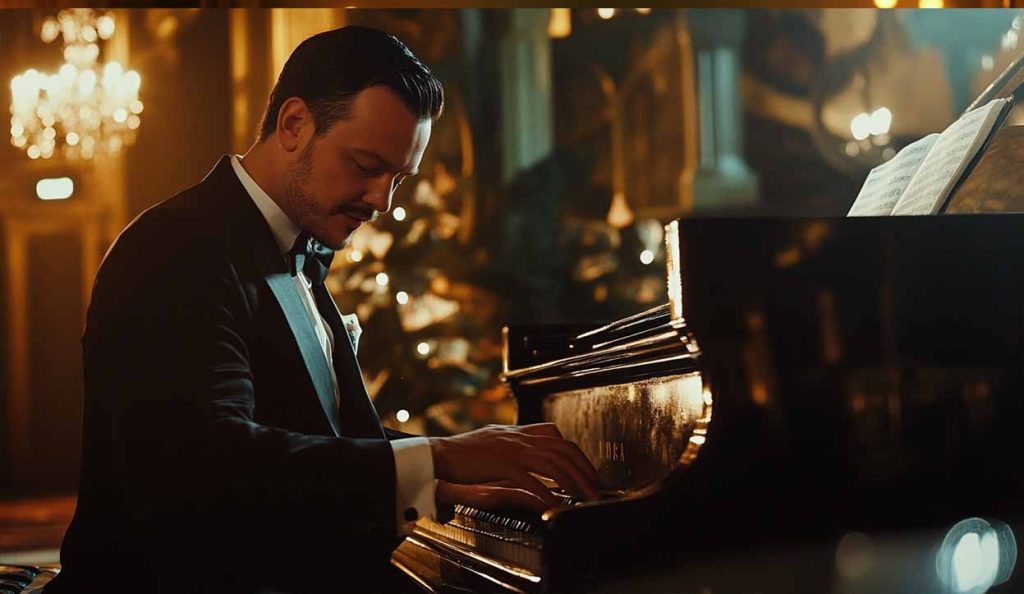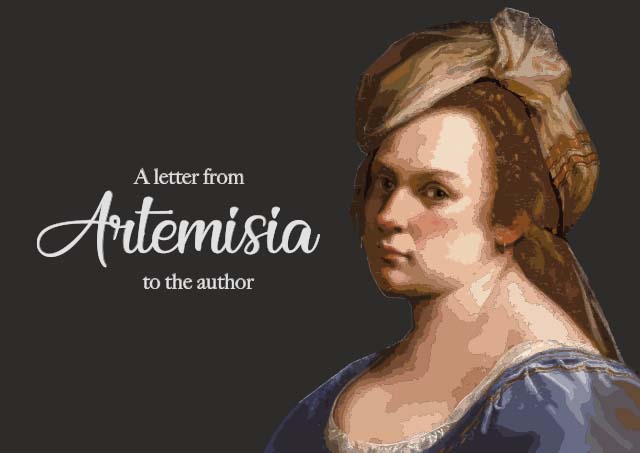
Novecento: La Leggenda del Pianista sull’Oceano
Novecento: The Legend of the Pianist on the Ocean
A volte non si sta poi così male, se si ha una bella
storia da raccontare e qualcuno disposto ad ascoltarla.
You’re really not that bad off if you have a good
story to tell and someone to whom you can tell it.

Il potere di una storia condivisa
The power of a story shared
La citazione “You’re really not that bad off if you have a good story to tell and someone to whom you can tell it” proviene dal monologo Novecento dell’autore italiano Alessandro Baricco. Racchiude l’essenza toccante e filosofica dell’opera, mettendo in evidenza il potere trasformativo del narrare e l’importanza della connessione umana. Questa frase sottolinea magnificamente un tema centrale della storia: il conforto e il significato profondo che si possono trovare nel condividere esperienze e nell’espressione creativa con gli altri.
The quote, “You’re really not that bad off if you have a good story to tell and someone to whom you can tell it,” comes from Italian author Alessandro Baricco’s monologue Novecento. It encapsulates the poignant and philosophical essence of the work, highlighting the transformative power of storytelling and the importance of human connection. This line beautifully underscores a central theme of the story—the profound solace and meaning found in sharing experiences and creative expression with others.
Leggete Novecento: Una storia unica
Read Novecento: A unique story
Leggete Novecento. È una storia deliziosa e scritta in un modo inusuale. Oltre a essere una lettura accessibile per studenti d’italiano, è breve e un ottimo esercizio per chi vuole praticare il congiuntivo! Secondo Baricco, il racconto è una via di mezzo tra “un’opera teatrale e una storia da leggere ad alta voce.” Giuseppe Tornatore ha catturato la teatralità del monologo e ha trasformato il testo nel film La Leggenda del Pianista sull’Oceano. Il film, uscito nel 1998, fu il primo di Tornatore girato in inglese e vinse numerosi premi per la colonna sonora di Ennio Morricone. MORRICONE VINCE UN OSCAR.
Read Novecento. It is a delightful tale, written in an unusual way. Aside from being an accessible read for Italian students, it is short and an excellent exercise for those practicing the subjunctive! According to Baricco, the story lies somewhere between “a staged play and a story meant to be read aloud.” Giuseppe Tornatore captured the theatrical essence of the monologue and transformed it into the film The Legend of the Pianist on the Ocean. Released in 1998, it was Tornatore’s first film in English and won numerous awards for Ennio Morricone’s soundtrack. READ ABOUT MORRICONE WINNING AN OSCAR.

Un pianista nato sul mare
The pianist born on the sea
La vita, a volte, offre troppe opzioni. Troppi bivi da prendere. Si rimane sopraffatti dall’enormità di vivere. Il mondo può essere troppo bello, il viaggio troppo lungo, il profumo troppo intenso. A volte, il mondo è una nave troppo grande da navigare.
Sometimes life presents too many choices. One is overwhelmed by the enormity of living. The world is too beautiful, the voyage too long, the perfume too strong. Sometimes, the world is a ship too big to navigate.

Una vita tra i tasti del pianoforte
A life between piano keys
Questo è il dilemma di Danny Boodman T.D. Lemon Novecento, il più grande pianista mai esistito sul mare e il protagonista del monologo di Alessandro Baricco, Novecento. Nato e abbandonato a bordo del transatlantico Virginian, il neonato orfano viene trovato da Danny Boodman, un marinaio che lo cresce fino all’età di otto anni, prima di morire in seguito a un infortunio durante una tempesta. Ma il piccolo Novecento si rifiuta di lasciare la nave. Scompare per giorni e riappare solo quando la nave riprende il viaggio, mostrando per la prima volta il suo talento straordinario al pianoforte.
This is the dilemma of Danny Boodman T.D. Lemon Novecento, the greatest pianist to ever play on the sea and the protagonist in Alessandro Baricco’s monologue, Novecento. Born and abandoned on the transatlantic liner Virginian, the orphaned baby is found by Danny Boodman, a seaman who raises him until the age of eight, before succumbing to an injury sustained during a storm. But young Novecento refuses to leave the ship. He vanishes for days and reappears only when the ship sets sail again, demonstrating for the first time his virtuosity on the piano.

Il mondo che viene a lui
The world that comes to him
Novecento rimane sulla nave, unendosi all’orchestra del transatlantico. Col tempo, grazie al suo talento fenomenale, diventa il beniamino dell’alta società che viaggia sul Virginian, esibendosi per milionari, donne affascinanti e persone provenienti da ogni parte del mondo. Il mondo arriva a lui e, come una spugna, assorbe informazioni su luoghi lontani, persone, aromi, sapori, desideri e passioni altrui. È contento di vivere sospeso tra il suo pianoforte e il mare, creando melodie magiche.
Novecento remains on the ship, joining its orchestra. Over time, thanks to his phenomenal talent, he becomes a darling of high society aboard the Virginian, performing for millionaires, elegant women, and travelers from all over the world. The world comes to him, and like a sponge, he absorbs knowledge of distant places, people, aromas, flavors, desires, and passions. He finds contentment in living suspended between his piano and the sea, creating magical melodies.
Un mondo troppo grande da affrontare
A world too big to face
Una volta, Novecento prova a scendere dalla nave per vivere una vita sulla terraferma. Ma si ferma a metà passerella, bloccato dall’immensità di tutte le possibilità che il mondo gli offre. Torna indietro, trovando sicurezza nei tasti finiti del pianoforte, da cui riesce a creare infinite melodie. Novecento nasce sulla nave e lì muore, perché la vita sulla terraferma presenta troppe scelte per lui.
Once, Novecento attempts to leave the ship to live a life on land. But he stops midway on the gangplank, overwhelmed by the enormity of all the possibilities life on land offers. He retreats back to the ship, finding solace in the finite keys of his piano, from which he can create infinite melodies. Novecento is born on the ship, and it is there that he dies because life on land offers too many choices for him to bear.
Alla fine, Novecento ci ricorda che le storie hanno il potere di trascendere i confini dello spazio e del tempo, proprio come la musica per il suo protagonista. Attraverso il racconto, ci connettiamo, guariamo e troviamo significato anche nei viaggi più incerti. Come ci mostra Novecento, non è la vastità del mondo a definirci, ma la profondità delle connessioni che creiamo al suo interno. A volte, tutto ciò di cui abbiamo bisogno è una storia da raccontare e qualcuno disposto ad ascoltarla per sentirci davvero vivi.
In the end, Novecento reminds us that stories have the power to transcend the boundaries of space and time, just as music did for its protagonist. Through storytelling, we connect, we heal, and we find meaning in even the most uncertain of journeys. As Novecento shows us, it’s not the size of the world that defines us, but the depth of the connections we create within it. Sometimes, all we need is a story to tell and someone willing to listen to truly feel alive.











Tutti i tuoi posti sono belli, divertenti anzi utili ma questo è uno dei migliori. I love it!
Grazie Iris, lo scrittore Barrico mi ha ispirato con la sua storia. Leggere il libero e come leggere una poesia.